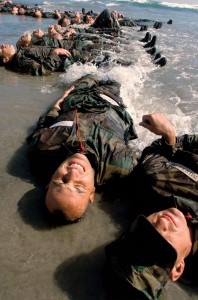It’s no secret that the military knows how to recruit.
It’s considerably harder to select and prepare people for battle than it is for the boardroom, even if it seems hard to tell the difference sometimes. What do they know about recruiting and training that we can use to grow our start-ups? Lots, as it turns out.
It’s about making employees better while they make the team better.
The discipline, professionalism, and dedication to the mission taught by military experience simply can’t be replicated. Military training is carefully designed to embed necessary qualities in recruits, and it does the job amazingly well.
Pushing for the best
It is truly life-changing. Soldiers, Sailors, Airmen, and Marines come away from their service with a new definition of their own boundaries. It’s always far higher than they thought possible.
“The military rank structure is designed to ensure members are pushed to grow and develop,” said Tiff Dunnivan, a 13-year Army veteran and sales guru here at The Resumator. “The promotion of one rank to another doesn’t mean that their job has changed or their position is different; it means that they have accomplished growth. Finding ways to promote growth gives employees direction and personal goals to achieve professional success.”
Your business isn’t a matter of life or death – so what? You can still make a huge difference in your employees’ lives by being a careful manager. Make it a priority to make every employee better at their jobs when they leave.
You recruit the best person available, but that doesn’t mean you can’t grow them into the best person anywhere. Expect the best and then help your team get there. Push them to achieve their very best every day. Pay attention and take advantage of teaching opportunities. Pay it forward with developing every employee and you’ll reap the rewards.
Set the bar high and keep it there
The U.S. Navy SEALs begin their training with a five-week Indoc period which exists just to set expectations at the beginning of the program. And the bar is set high.
 SEAL recruits often work harder in this introductory phase than they ever have in their lives, and that isn’t including rigorous classroom time spent learning the standards and practices of an elite special operations unit. They’re joining the best fighting force in the world, the thinking goes, so they’d better be prepared to work like it from the first day.
SEAL recruits often work harder in this introductory phase than they ever have in their lives, and that isn’t including rigorous classroom time spent learning the standards and practices of an elite special operations unit. They’re joining the best fighting force in the world, the thinking goes, so they’d better be prepared to work like it from the first day.
“The military doesn’t apologize for its standards,” Tiff added. “It doesn’t forgive failure. Once you swear in, you’re in. You take the rank and take responsibility. Make employees earn their job, every day, starting with the first day.”
This attitude should be one that defines your recruiting culture. We’ve seen how being on the team should be a transformational and rewarding experience, so let new employees earn their place at the table. Give them impactful work early on, and set the bar high. Expect excellence and reject mediocrity. Fix problems and pain points as you see them, and expect your team to do the same. Don’t shy away from welcoming new members to the team with either the rewards or the hard work; if you hired the right people, they wouldn’t want it any other way.
Esprit de corps matters
Everyone in the military thinks their branch is the best. It’s the group they’ve trained with, suffered with, and the group they’ll go to war with. It’s also the first group of people they’ll turn to for celebrating a victory. Even when things get tough or feelings get hurt, they know they can always turn to each other for support in facing a common challenge.
Make sure your team feels the same way. Set the stage; you’re out to conquer. It’s you against the world. Your team should genuinely believe that they’re the best team available to take care of the task at hand. Because when it comes down to it, “veni, vidi, vici” beats “coulda, shoulda, woulda.”
 Sometimes, who they are trumps what they’ve done.
Sometimes, who they are trumps what they’ve done.
The French Foreign Legion is notorious for overlooking what their recruits have done in the past. In fact, recruits weren’t allowed to enlist under their real names until 2010. Being accepted into the Foreign Legion is almost literally a new lease on life for those willing to serve. The recruits (who can be from anywhere, speaking any language) are immediately given food and shelter.
In only a few years, members of the Foreign Legion who have served in good standing can apply to become full and unconditional French citizens. But the price for this acceptance is high; service in the Legion is widely regarded as the most brutal and taxing of any military force in the world.
We aren’t suggesting you follow the lead of an organization that, as many point out, isn’t a shelter for international criminal anymore, at least publicly. But we are saying that there are some things more relevant to an applicant’s success than their past — their potential to do well in your company, for one.
Use the resume for what it is: one part of the puzzle. Get creative with your applications: we ask everyone to tell us, “What makes you unique?” Use your interviews to investigate an applicant’s personality as much as their resume.
Note: A special thanks to Tiff Dunnivan, a sales guru at The Resumator and 13-year Army National Guard veteran who deployed in support of NATO peacekeeping missions in Bosnia as well as Operation Iraqi Freedom.
This article originally appeared on The Resumator Blog.
